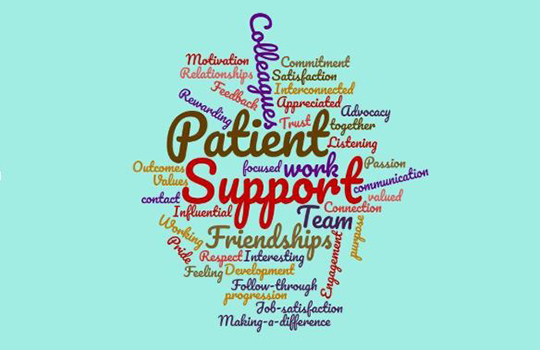The National Health Service is the United Kingdom’s largest employer, committed to delivering high quality, safe healthcare, and dependent on an engaged, properly resourced workforce to cope with ever rising demand. The NHS Five Year Forward View (2014) highlighted the need for greater support to the NHS workforce and yet today more than 100,000 NHS posts are unfilled (that is, 1:11) in NHS hospitals, ambulance, and mental health trusts and a third of these are in nursing.
Positive staff engagement has been linked to reduced staff turnover, lower sickness absence, reduced presenteeism and improved patient experience whilst Maben has found positive associations between staff wellbeing and improved patient experience. Along with the 2008 Boorman report, these studies demonstrate the value of investing in staff engagement in terms of quality and value for money.
Employee engagement is the subject of much academic debate, some of it somewhat sterile and unrewarding, but the links with benefits for employees and organisations make it a compelling topic. Broadly summarised, engagement refers to a psychological state or attitude, in which people are positive about traits, such as satisfaction, commitment, and involvement towards their job, role, or organisation. It is positively associated with staff-wellbeing. The validated proxy indicators for engagement in the NHS (as measured via the NHS Staff Survey) are derived from answers to questions about: the likelihood that employees would recommend the organisation as a place to work; employee motivation at work; and employee ability to contribute towards improvements.
In 2016, the Health Foundation commissioned a multi-method study involving secondary analysis of staff survey data, interviews with stakeholders and case studies of three NHS trusts that demonstrated improved engagement in their NHS staff survey results. What made this study unique was that we included the voices of staff from up, down and across the three case study hospitals, speaking to health care assistants, nurses and administrative staff as well as to directors and chief executives—thus producing rare insights into what engagement means at the front-line and the board room.
Analysis of our data suggested that for front line staff, what got them into work in the morning and made them feel most connected and engaged, was both relationships with their immediate team and the sense that they made a difference to patient outcomes. For managers, on the other hand, the organisational narrative relating to quality outcomes and empowering and involving staff was more strongly emphasised. This finding may influence the direction of future initiatives to increase engagement and it is conceivable that the focus should be shifted more towards the local and departmental level. Importantly staff demanded honesty from management, becoming disengaged when the organisational narrative espoused by frontline staff on the one hand and management on the other became too dissonant.
The majority of staff we interviewed spontaneously linked staff engagement to positive outcomes which benefit all:
“If staff are happier then this leads to less sickness absence, and staff are less inclined to take time off. This leads to a more stable workforce which results in higher quality care, less locums, less agency spend, so more money to spend on other needed resources.” (director/manager)
Whilst staff at all levels saw staff engagement as key to effective working, those who have the most contact with patients linked “engagement” directly to a “patient-focussed vision.” For these healthcare workers, engagement was often linked to knowing they could make a difference.
“There was a woman who kept on coming into reception in her pyjamas. She was very anxious. One of the receptionist established a rapport with her and the next time she came in she was dressed. She said that she’d been treated so well that she had wanted to make an effort. That sort of thing makes a big difference!” (non-clinical staff member, focus group)
Other key factors were the quality of relationships with peers and colleagues, being treated with kindness, and feeling valued by patients and managers alike, and being supported by managers.
Figure 1: Word cloud showing the most common terms used by healthcare staff to describe staff engagement in interviews at three NHS trusts
The three things staff told us they value are: honest communication; direct feedback from their own patients; and knowing how their contribution ultimately impacts on patients. These things matter particularly to non-clinical staff—who may not have direct or sustained contact with patients, but whose work supports the organisations and maintains its processes in crucial ways. Staff want to be treated with respect as thinking adults.
The trust interviews and focus groups took place in the summer and autumn of 2017—before the winter months—and yet, even then, employees told us they felt that every last drop of blood was being squeezed out of them, with patient demand, quality, and cost “improvement” measures and reductions in staff numbers. However, in two trusts, staff also said that when managers openly acknowledge that the level of stress is detrimental and unsustainable, it goes some way towards feeling that employees and management are on the same side and are all in it together.
Reflecting on our experiences of working in the case study trusts, we were struck by the ever increasing rate and pace of work and the need for NHS managers to ensure that the moral as well as the business case for change is made. Employers ignore the need to take action to support, nurture, and value their people in clinical and support healthcare roles at their peril.
Rhiannon Barker is presenting findings from the case studies on staff engagement mentioned in this piece at The Health Foundation Annual Conference on 22nd May: The human element: A vital catalyst for improvement’.
 Rhiannon Barker, Centre for Health Service Studies, University of Kent and previously Head of Business Development at The Point of Care Foundation, where this work was carried out.
Rhiannon Barker, Centre for Health Service Studies, University of Kent and previously Head of Business Development at The Point of Care Foundation, where this work was carried out.
 Karen Ford, health research and policy consultant. Karen worked for and advised the NHS for over 25 years and is now an independent research and policy consultant. She was commissioned by The Point of Care Foundation.
Karen Ford, health research and policy consultant. Karen worked for and advised the NHS for over 25 years and is now an independent research and policy consultant. She was commissioned by The Point of Care Foundation.
 Jocelyn Cornwell, is the founder and chief executive of The Point of Care Foundation.
Jocelyn Cornwell, is the founder and chief executive of The Point of Care Foundation.
Competing interests: None of the authors declare any conflict of interest. The Point of Care Foundation received funding from The Health Foundation to carry out the research; the other research partners were RAND and The Work Foundation.

